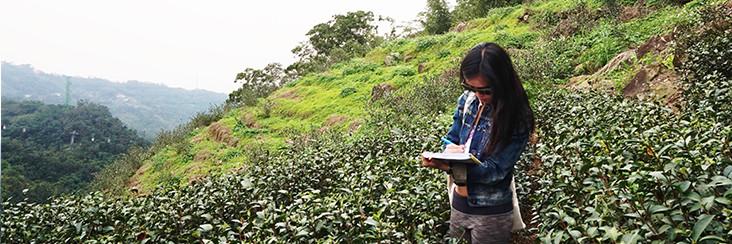
Eco-Cha Represents Taiwan's Artisan Tea Culture
Dana Ter, freelance writer and staff reporter for the Features section of the Taipei Times, recently approached Eco-Cha to be a subject of a piece she wrote on Taiwan's artisanal tea culture. We happily cooperated, and responded to her request to visit tea farms in the Taipei area by taking her to meet two tea farmers whom we've befriended in recent years. It turned out to be just what Dana was looking for — tea producers who represent the boutique artisan tea culture in Taiwan.
In the photos above, we are on our second trip to Muzha, as Dana continues to research and write about Taiwan's local traditional specialty teas for Philippine Airlines' Mabuhay magazine in the upcoming April edition. Dana takes notes while our host Zhang Ming Feng patiently responds to Eco-Cha Andy's incessant questions about his work. Mr. Zhang is a pioneering professional in Taiwan's artisan tea industry. He is a master craftsman of Taipei Muzha's traditionally made Tieguanyin Oolong, as well as Shuixian Black Tea, and some new types that even he has not decided on a name for!
Mr. Zhang has been experimenting with organic cultivation of heirloom strains of tea plants as well as innovative processing methods for decades. In these photos we see heirloom Tieguanyin tea trees that he is allowing to grow in their natural form rather than pruning them into a rounded or flat-topped bush that is standard practice for maximum yield and optimal harvesting of the new growth leaves. Mr. Zhang is an anomaly of a tea farmer in that he is relentless in his efforts to use his resources to produce the most distinctive high quality tea possible. He is the living embodiment of putting quality over quantity in his work as a unique specialty tea craftsman.
Part of his personal philosophy is that allowing the tea to grow naturally will produce leaves with the most substance, which is the basis of producing exemplary tea. He is attempting to maximize the constituents in the tea leaves by growing and harvesting them as naturally as possible, but it doesn't stop there. He believes that processing the leaves in a way that maintains these constituents is equally important. He feels that the essential quality of a distinctly aromatic lingering aftertaste is what has been sacrificed by modern tea production. He says that this quality that we knew and loved decades ago is virtually non-existent these days. And he is committed to recovering that lost character profile which in his mind defines a truly distinctive specialty tea.
At the same time, he is flexible and progressive in his practice. Above we see a plot of organically grown Jin Xuan Oolong and in the background is a recently planted plot — providing us with new living evidence that Mr. Zhang is continuing to expand rather than dwindle in his efforts. He is cultivating a hybrid strain that has been proven successful in low elevation environs, and has wide versatility in its production methods. Most recently, he has begun processing these leaves in a similar way to Pu Er tea from mainland China. He believes that the hearty character of Pu Er is not only due to the wild strain of tea tree, but also the simple, non-invasive pre-modern processing methods employed. We are truly inspired by his work and honored to have the opportunity to learn from his experience.





